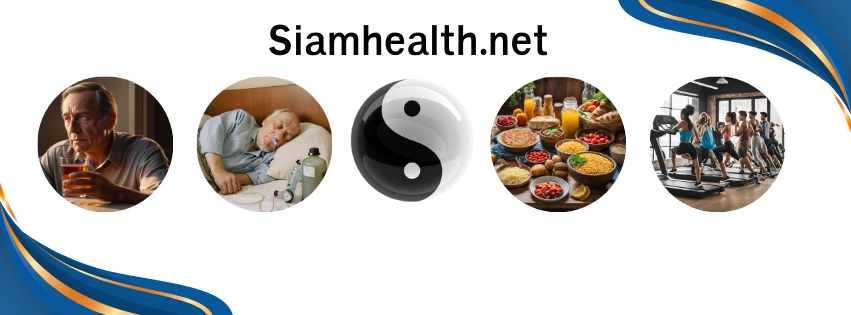
หน้าหลัก | สุขภาพดี | สุภาพสตรี | การแปลผลเลือด | โรคต่างๆ | ยารักษาโรค |วัคซีน | อาหารเพื่อสุขภาพ
การนอนหลับ ประสิทธิภาพ และความปลอดภัยสาธารณะ
ความต้องการและความคาดหวังของสังคมยุคใหม่ได้สร้างความกดดันด้านเวลาเพิ่มขึ้นเรื่อยๆ และบ่อยครั้งที่ผู้คนแก้ปัญหาด้วยการลดเวลานอนลง
ในขณะเดียวกัน ก็เป็นที่ชัดเจนมากขึ้นเรื่อยๆ ว่า ผลกระทบจากการนอนหลับไม่เพียงพอ นั้นร้ายแรงกว่าที่คนส่วนใหญ่ตระหนัก
งานวิจัยทางวิทยาศาสตร์เผยให้เห็นว่า การอดนอน หรือแม้แต่การนอนหลับที่ไม่มีคุณภาพ สามารถนำไปสู่การ เพิ่มขึ้นของข้อผิดพลาดในที่ทำงาน ประสิทธิภาพการทำงานลดลง และ อุบัติเหตุที่คร่าทั้งชีวิตและทรัพยากร การตระหนักถึงเรื่องนี้จะช่วยให้คุณปรับปรุงพฤติกรรมการนอนหลับและเพิ่มความปลอดภัยของคุณได้
คุณสมบัติในหน้านี้
-
การนอนหลับและการตัดสินใจ
-
การขับขี่ขณะง่วงนอน
-
ปัจจัยที่มีผลต่อประสิทธิภาพของการนอน
การอดนอนอาจส่งผลกระทบอย่างรุนแรงต่อประสิทธิภาพการทำงาน ซึ่งบางครั้งนำไปสู่ผลลัพธ์ที่เลวร้ายในระยะยาว
อุบัติเหตุที่มีค่าใช้จ่ายสูงและป้องกันได้
แม้ว่าการนอนหลับไม่เพียงพออาจไม่ใช่ข่าวพาดหัวหลักในการรายงานอุบัติเหตุร้ายแรงในช่วงหลายทศวรรษที่ผ่านมา แต่ก็ไม่ได้หมายความว่าความเหนื่อยล้าและการขาดสมาธิจากการอดนอนไม่มีบทบาทในภัยพิบัติเหล่านี้ ตัวอย่างเช่น ผู้สอบสวนได้สรุปว่าการอดนอนเป็นปัจจัยสำคัญใน อุบัติเหตุนิวเคลียร์ที่เกาะทรีไมล์ในปี 1979 และ การหลอมละลายนิวเคลียร์ที่เชอร์โนบิลในปี 1986 การสอบสวนกรณีเรือบรรทุกน้ำมัน เอ็กซอน วัลเดซ เกยตื้น และการระเบิดของกระสวยอวกาศ แชลเลนเจอร์ ก็สรุปได้ว่าการอดนอนมีบทบาทสำคัญในอุบัติเหตุเหล่านี้เช่นกัน ในทั้งสองกรณี ผู้ที่รับผิดชอบการปฏิบัติงานและต้องตัดสินใจที่สำคัญกำลังปฏิบัติงานภายใต้ภาวะอดนอนอย่างรุนแรง แม้ว่าภัยพิบัติแชลเลนเจอร์จะทำให้โครงการกระสวยอวกาศมูลค่าหลายพันล้านดอลลาร์ตกอยู่ในอันตราย แต่การรั่วไหลของน้ำมันจากเอ็กซอน วัลเดซ กลับสร้างความเสียหายต่อระบบนิเวศ สิ่งแวดล้อม และเศรษฐกิจอย่างประเมินค่าไม่ได้
การนอนหลับกับการตัดสินใจ (1:06)
นายแพทย์ โรเบิร์ต สติ๊กโกลด์ พูดคุยเกี่ยวกับงานวิจัยที่ชี้ให้เห็นความเชื่อมโยงระหว่างการอดนอนกับการตัดสินใจที่บกพร่องมากขึ้น
[ดูวิดีโอ]
นอกเหนือจากความเชื่อมโยงระหว่างภัยพิบัติสำคัญๆ เหล่านี้กับการอดนอนแล้ว ยังมีการตระหนักถึงความเชื่อมโยงระหว่างการขาดการนอนหลับกับ ข้อผิดพลาดทางการแพทย์ในโรงพยาบาล ของเรามากขึ้นเรื่อยๆ จากข้อมูลของ Institutes of Medicine พบว่ามีผู้บาดเจ็บกว่าหนึ่งล้านคน และผู้เสียชีวิตระหว่าง 50,000 ถึง 100,000 คนในแต่ละปีที่เกิดจากข้อผิดพลาดทางการแพทย์ที่ป้องกันได้ ซึ่งหลายกรณีอาจเป็นผลมาจากการนอนหลับไม่เพียงพอ แพทย์ โดยเฉพาะอย่างยิ่งแพทย์ประจำบ้านที่เพิ่งจบใหม่ มักถูกคาดหวังให้ทำงานต่อเนื่อง 24 ถึง 36 ชั่วโมง โดยมีโอกาสนอนหลับเพียงเล็กน้อยหรือไม่มีเลย แม้ว่าจะยากที่จะประเมินขอบเขตที่การอดนอนมีผลต่อข้อผิดพลาดทางการแพทย์ แต่การศึกษาได้แสดงให้เห็นผลกระทบที่สำคัญ ตัวอย่างเช่น การศึกษาในปี 2004 ที่นำโดย นายแพทย์ ชาร์ลส์ ซีซเลอร์ จาก Division of Sleep Medicine, Harvard Medical School พบว่าโรงพยาบาลสามารถลดจำนวนข้อผิดพลาดทางการแพทย์ได้มากถึง 36 เปอร์เซ็นต์ โดยการจำกัดชั่วโมงการทำงานของแพทย์แต่ละคนไว้ที่ 16 ชั่วโมง และลดตารางการทำงานทั้งหมดไม่เกิน 80 ชั่วโมงต่อสัปดาห์
การทำงานกะยาวนานและปัจจัยอื่นๆ ที่ส่งผลให้เกิดการอดนอนก็มีผลต่อความปลอดภัยบนทางหลวงของเราเช่นกัน การสำรวจของ National Sleep Foundation เปิดเผยว่า ร้อยละ 60 ของผู้ขับขี่ผู้ใหญ่ หรือประมาณ 168 ล้านคน กล่าวว่าพวกเขาเคยขับขี่ยานพาหนะในขณะที่รู้สึกง่วงนอนในปีที่ผ่านมา และ มากกว่าหนึ่งในสาม (103 ล้านคน) เคยหลับในขณะขับรถไปแล้ว โชคร้ายที่สถานการณ์เหล่านี้จำนวนมากจบลงด้วยโศกนาฏกรรม สำนักงานบริหารความปลอดภัยการจราจรบนทางหลวงแห่งชาติ (National Highway Traffic Safety Administration) ประมาณการว่า อุบัติเหตุที่ตำรวจรายงาน 100,000 ครั้ง เป็นผลโดยตรงจากความเหนื่อยล้าของผู้ขับขี่ในแต่ละปี และถือว่าเป็นการประมาณการที่ต่ำไป ข้อมูลล่าสุดชี้ให้เห็นว่าจำนวนที่แท้จริงอาจสูงกว่ามาก The Institute of Medicine ประมาณการ โดยอิงจากการศึกษาตามธรรมชาติและระบาดวิทยาคุณภาพสูงล่าสุด ว่า การขับขี่ขณะง่วงนอนมีส่วนรับผิดชอบถึง 20 เปอร์เซ็นต์ของอุบัติเหตุทางรถยนต์ทั้งหมด นั่นหมายความว่าการขับขี่ขณะง่วงนอนทำให้เกิดอุบัติเหตุประมาณ 1 ล้านครั้ง ผู้บาดเจ็บ 500,000 ราย และผู้เสียชีวิต 8,000 รายในแต่ละปีในสหรัฐอเมริกา
การขับขี่ขณะง่วงนอน (0:42)
นายแพทย์ ชาร์ลส์ ซีซเลอร์ พูดคุยถึงความเชื่อมโยงระหว่างอุบัติเหตุทางรถยนต์กับผู้ขับขี่ที่เหนื่อยล้า
[ดูวิดีโอ]
นาธาเนียล ไคลต์แมน ในทศวรรษ 1930 ได้สร้างหลักฐานทางวิทยาศาสตร์แรกเริ่มบางส่วนที่เชื่อมโยงระหว่างการนอนหลับกับประสิทธิภาพ
การอดนอนส่งผลต่อประสิทธิภาพทางจิตใจอย่างไร
หลักฐานทางวิทยาศาสตร์แรกเริ่มที่เชื่อมโยงระหว่างการนอนหลับกับประสิทธิภาพย้อนกลับไปในช่วงต้นทศวรรษ 1930 เมื่อ นาธาเนียล ไคลต์แมน หนึ่งในบุคคลสำคัญที่สุดในสาขาเวชศาสตร์การนอนหลับ ได้ค้นพบรูปแบบประจำวันในความเร็วและความแม่นยำของประสิทธิภาพการรับรู้ เขาแสดงให้เห็นว่าแม้ในบุคคลที่ได้รับการพักผ่อนอย่างดี ก็ยังมีการลดลงของระดับประสิทธิภาพส่วนบุคคลที่เกิดขึ้นในช่วงเช้าตรู่และอีกครั้งในช่วงดึก ดังนั้น แม้ว่าเราจะนอนหลับได้ตามปริมาณที่ต้องการ เราก็ยังคงคาดหวังการผันผวนตามปกติในความสามารถในการทำงานของเราได้
นอกจากการผันผวนตามปกติเหล่านี้ การนอนหลับไม่เพียงพอ ไม่ว่าจะเป็นเพียงคืนเดียว หรือเป็นเวลาหลายสัปดาห์ถึงหลายเดือน ก็มีผลอย่างมากต่อความสามารถในการทำงานของเรา การอดนอนส่งผลเสียต่ออารมณ์ ความสามารถในการจดจ่อ และความสามารถในการเข้าถึงการทำงานของสมองระดับสูง การรวมกันของปัจจัยเหล่านี้คือสิ่งที่เราโดยทั่วไปเรียกว่า ประสิทธิภาพทางจิตใจ ในห้องปฏิบัติการ นักวิจัยใช้การศึกษาทางวิทยาศาสตร์เพื่อระบุว่าระดับความผิดปกติของการนอนหลับที่แตกต่างกันส่งผลกระทบต่อประสิทธิภาพทางจิตใจประเภทต่างๆ อย่างมีนัยสำคัญเพียงใด
ปัจจัยที่มีผลต่อประสิทธิภาพ (1:43)
นายแพทย์ ชาร์ลส์ ซีซเลอร์ อธิบายสี่ปัจจัยที่ส่งผลต่อความตื่นตัวและประสิทธิภาพ
[ดูวิดีโอ]
ภาพขยาย: เยื่อหุ้มสมองส่วนหน้า (Prefrontal cortex) มีหน้าที่ในการทำงานของสมองระดับสูงหลายอย่างและมีความเปราะบางเป็นพิเศษต่อการขาดการนอนหลับ
ผลกระทบที่เห็นได้ชัดเจนที่สุดของการอดนอนคือ อาการง่วงนอน ในชีวิตประจำวัน เราอาจประสบกับภาวะนี้ในรูปแบบของความเหนื่อยล้าทั่วไป การขาดแรงจูงใจ หรือแม้กระทั่งการหลับใน ในการวิจัยหรือสถานพยาบาล นักวิทยาศาสตร์จะวัดอาการง่วงนอนโดยใช้วิธีการที่หลากหลาย หลังจากอดนอน จะมีการเปลี่ยนแปลงที่สังเกตได้ในการทำงานของสมอง ซึ่งวัดโดย คลื่นไฟฟ้าสมอง (EEG) การเปลี่ยนแปลงเหล่านี้สอดคล้องกับระดับความตื่นตัวที่ลดลงและแนวโน้มที่จะหลับโดยทั่วไป การตื่นต่อเนื่องเกินกว่า 16 ชั่วโมงโดยปกติจะนำไปสู่การเปลี่ยนแปลงที่วัดได้เหล่านี้
นอกเหนือจากความรู้สึกง่วงนอนและการเปลี่ยนแปลงของการทำงานของสมองที่มาพร้อมกับการอดนอนหนึ่งคืนแล้ว การวัดประสิทธิภาพอื่นๆ ก็มีการเปลี่ยนแปลงอย่างเห็นได้ชัด สมาธิ ความจำใช้งาน ความสามารถทางคณิตศาสตร์ และการให้เหตุผลเชิงตรรกะ ล้วนเป็นแง่มุมของการทำงานของสมองที่ถูกกระทบจากการอดนอน อย่างไรก็ตาม ฟังก์ชันเหล่านี้ไม่ได้ขึ้นอยู่กับสมองส่วนเดียวกันทั้งหมด และก็ไม่ได้ได้รับผลกระทบจากการอดนอนในระดับเดียวกัน ตัวอย่างเช่น เยื่อหุ้มสมองส่วนหน้า (PFC) ซึ่งมีหน้าที่ในการทำงานของสมองระดับสูงหลายอย่าง มีความเปราะบางเป็นพิเศษต่อการขาดการนอนหลับ ส่งผลให้ผู้ที่อดนอนจะเริ่มแสดงความบกพร่องในงานหลายอย่างที่ต้องใช้เหตุผลเชิงตรรกะหรือความคิดที่ซับซ้อน
อ้างอิง:
-
Harrison Y, Horne J. 2000. The impact of sleep deprivation on decision making: A review. Journal of Experimental Psychology: Applied. 6:236-249.
-
Landrigan CP, Rothschild JM, Cronin JW, Kaushal R, Burdick E, Katz JT, Lilly CM, Stone PH, Lockley SW, Bates DW, Czeisler CA. 2004. Effect of reducing interns' work hours on serious medical errors in intensive care units. New England Journal of Medicine. 351:1838-1848.
การกำหนดว่าประสิทธิภาพได้รับผลกระทบจากการอดนอนมากน้อยเพียงใดนั้นเป็นเรื่องยาก ส่วนหนึ่งเป็นเพราะปัจจัยต่างๆ เช่น ความแตกต่างของแต่ละบุคคลในการตอบสนองต่อการอดนอน รวมถึงความแตกต่างของแต่ละบุคคลในแรงจูงใจที่จะตื่นตัวแม้จะอดนอน อย่างไรก็ตาม หลักฐานก็ชัดเจนว่า การขาดการนอนหลับนำไปสู่ประสิทธิภาพที่ต่ำลง เมื่อความชุกของการนอนหลับไม่เพียงพอเพิ่มขึ้นและความต้องการของสถานที่ทำงานเปลี่ยนแปลงไป การตระหนักและดำเนินการเพื่อลดผลกระทบของการนอนหลับไม่เพียงพอต่อความปลอดภัยและความเป็นอยู่ที่ดีของเราจึงมีความสำคัญมากยิ่งขึ้น
บทความนี้ให้ข้อมูลที่ครบถ้วนและอ้างอิงจากแหล่งข้อมูลที่น่าเชื่อถือเกี่ยวกับผลกระทบของการอดนอนต่อประสิทธิภาพการทำงานและความปลอดภัย คุณต้องการให้ผมสรุปประเด็นสำคัญ หรือเน้นย้ำในส่วนใดเป็นพิเศษไหมครับ?
